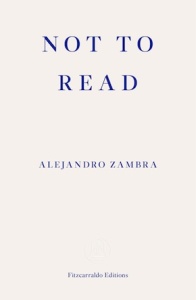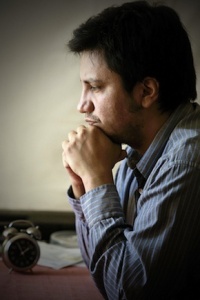Against poets
by Alejandro Zambra
“When I read Zambra I feel like someone’s shooting fireworks inside my head.” Valeria Luiselli
At twenty years old they already have some important experiences behind them: they’ve published poems in journals and anthologies, taken part in workshops, written articles for school yearbooks, and maybe they have granted one or two premature interviews. They already have their first books ready, and they’re about to come out from emerging publishing houses. They are very bad books, but for now that doesn’t matter. They write long and sententious poems that abuse the gerund, the exclamation mark, and ellipses. They read Vicente Huidobro, Delmira Agustini, and Oliverio Girondo, but above all they read each other, in interminable sessions that are only friendly at times.
By twenty-five they have disavowed those first poems, which they consider distant sins of youth. They hope that soon they will find maturity as poets, which is much more important to them than finding maturityas people. The second book goes above and beyond their goal: it’s not good, but it is inarguably better than the first. They talk about how they are still looking for a voice of their own, and meanwhile they plan anthologies that include their whole peer group; no one wants to write the prologue, though, because no one wants to run the risk of becoming a literary critic.
By thirty, they’ve suffered several discouragements. They have been included in national and Latin American anthologies, but they’ve been left out of some other publications and that’s been very hard for them to accept. At times they write only to demonstrate how arbitrary those exclusions have been. They have published, by this point, three books of poetry. They have founded two publishing houses and four literary magazines. Their biographical notes proclaim that they have participated in over thirteen – fourteen, that is – poetry conferences and that their books have been partially translated to Italian. Really, it’s only one poem that’s been translated, but it doesn’t matter: they’ve been translated, and that’s enough.
Poets suffer more during the so-called mid-life crisis than regular people do. They didn’t decide to become poets just so they could be forty years old. From now on it’ll all be downhill.”
 Only at thirty-five do they start to feel uncomfortable when they’re introduced as young poets. Now they give writing workshops in which they advise their students to avoid gerunds, to be careful with adjectives, to declare war on ellipses and exclamation points. They inculcate the utmost creative freedom in their pupils, but they forbid a pretty long list of words: void, anguish, desolation, desperation, dusk, twilight, soul, spirit, heart, vagina. They talk to them about molopoeia, phanopoeia, and logopoeia, but they get a little tangled up in the explanation. They fall in love with sixteen-year-old poets and compare them with Alejandra Pizarnik, but they’ve never seen a photo of Alejandra Pizarnik.
Only at thirty-five do they start to feel uncomfortable when they’re introduced as young poets. Now they give writing workshops in which they advise their students to avoid gerunds, to be careful with adjectives, to declare war on ellipses and exclamation points. They inculcate the utmost creative freedom in their pupils, but they forbid a pretty long list of words: void, anguish, desolation, desperation, dusk, twilight, soul, spirit, heart, vagina. They talk to them about molopoeia, phanopoeia, and logopoeia, but they get a little tangled up in the explanation. They fall in love with sixteen-year-old poets and compare them with Alejandra Pizarnik, but they’ve never seen a photo of Alejandra Pizarnik.
When they’re forty years old no one thinks to introduce them as young poets; their faces and bellies have changed, perhaps irreversibly. Poets suffer more during the so-called mid-life crisis than regular people do. They didn’t decide to become poets just so they could be forty years old. From now on it’ll all be downhill. They’ve become inoffensive. It’s much easier to ask them for prologues than to fight against them, better to invite them to readings and applaud them without enthusiasm, respectfully. They are, in other words, true failures.
For the failure to be complete they must receive, from time to time, misleading signals. At fifty, at sixty, at seventy years old the poets will win two or three minor prizes; timid undergrads and perhaps one or another attractive doctoral student will analyse their books, which will maybe be translated to French, German, Greek, or at least Argentine. What’s more, there will always be some emerging publishing house interested in rescuing them from oblivion.
It’s pitiful to see them next to the phone, waiting for the news of a prize, a government pension, an homage, a little trip to the south, whatever. They look like frightened children, teenagers now too old to commit suicide. Sometimes a compassionate reporter will ask them what good poetry is in this dehumanized and consumerist world. They sigh and reply the same as they always have: that only poetry will save the world, that amid all the confusion we must seek out true words and hold on tightly to them. They say it without faith, routinely, but they are entirely right.
© Alejandro Zambra, 2008. From the collection Not to Read (Fitzcarraldo Editions, £12.99)
 Alejandro Zambra is a Chilean writer, poet and critic. His first novel Bonsai was awarded Chile’s Literary Critics’ Award for Best Novel. He is also the author of The Private Lives of Trees and Ways of Going Home, which won the Altazor Award and the National Council Prize for Books. My Documents, published by Fitzcarraldo Editions in 2015, was shortlisted for the 2015 Frank O’Connor International Short Story Prize. His latest novel is Multiple Choice. His writing has been translated into more than fifteen languages and has appeared in the New Yorker, the Paris Review, Tin House, Harper’s, Granta and McSweeney’s, among others. He lives in Mexico City. Not to Read, translated and edited by Megan McDowell, is out now in paperback from Fitzcarraldo Editions.
Alejandro Zambra is a Chilean writer, poet and critic. His first novel Bonsai was awarded Chile’s Literary Critics’ Award for Best Novel. He is also the author of The Private Lives of Trees and Ways of Going Home, which won the Altazor Award and the National Council Prize for Books. My Documents, published by Fitzcarraldo Editions in 2015, was shortlisted for the 2015 Frank O’Connor International Short Story Prize. His latest novel is Multiple Choice. His writing has been translated into more than fifteen languages and has appeared in the New Yorker, the Paris Review, Tin House, Harper’s, Granta and McSweeney’s, among others. He lives in Mexico City. Not to Read, translated and edited by Megan McDowell, is out now in paperback from Fitzcarraldo Editions.
Read more
@azmbra
Author portrait © Mabel Maldonado
Megan McDowell has translated many contemporary authors from Latin America and Spain, including Samanta Schweblin, Mariana Enriquez, Lina Meruane, Diego Zúñiga and Carlos Fonseca. Her translation of Alejandro Zambra’s Ways of Going Home won the 2013 English PEN award for writing in translation, and her translation of Samanta Schweblin’s Fever Dream was shortlisted for the Man Booker International Prize in 2017. She lives in Santiago, Chile.
meganmcdowelltranslation.com

